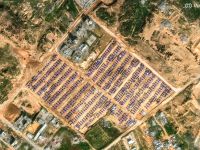Khaled Abol Naga says film festivals in Cannes, Venice and Berlin more important than American film awards.
A prominent Egyptian film writer, producer and actor says Arab audiences should stop focusing on the Oscars, as the awards are for American films and not international ones. Khaled Abol Naga, a champion of the independent cinematic world who was in Dubai last week to promote accessible digital film technology, said the Oscars are “not important” to foreign filmmakers.
Abol Naga held an open Question and Answer session after the screening of award-winning Egyptian film Microphone, the first feature film to be made entirely on digital photographic camera, which Abol Naga both starred in and produced.
In response to a question posed by a woman about why Arabs prefer to watch American box office hits rather than Arabic cinema, and why the Oscars overlooked Arab films, Abol Naga told her: “The answer to your first question is your second question”.
“Why they prefer American films is because their eyes are focused on the Oscars and the Oscars are for American films, there is only one foreign film category…the Oscars are not that important at all if you’re doing foreign films.”
Of far greater importance are festivals such as Cannes, Venice and Berlin. “The Oscars are not a film festival, it is the American Academy film awards…it’s a lot of glam, but it’s not ours, it’s not anybody’s but America’s.”
He said for a long time he felt similarly focused on Western films till the Egyptian film industry began to undergo a revolution of sorts — before the revolution that happened on Egypt’s streets. After watching the independent Egyptian film Kit Kat, he began to get hooked on Arab films. “And it made me want to be part of that industry, there’s something real going on. It’s really cinema.”
The reason interest in Arab films has died down over recent decades is because it has gone through a prolonged period of stagnation due to the political stranglehold of many dictators, who have now been ousted as a result of the Arab Spring.
“The stagnation in our Arab world must have been reflected on film-making, on the arts, on everything, until there was enough young people who felt something was wrong, until the technology made them connect and they knew what it was to be living in a free world … only then it was possible to have … a (cultural) revolution.”
It was almost guaranteed a revolution — both cultural and civic — would take place after such a long stretch of suppression, Abol Naga said. “You can’t keep all of this energy held for so long and not have a revolution.”
Technology is a huge tool in this revival of the arts in the Arab world, he said. “There’s a whole evolution of technology that went into a revolution in what we will do with these cameras.”
Most award-winning Arab films in recent years have been produced by “independent people in the film world”, without the backing of producers with multi-million dollar budgets, he said. However Microphone director Ahmad Abdalla’s decision to use the DSLR Canon 7D camera, one of the first with HD filming capabilities, to film the low-budget movie was an artistic choice rather than a financial one.
“We had enough funds to buy a (cinematic-standard) 35-millimetre camera … but since we were doing a film about the underground arts scene in Alexandria, (we thought) we may as well use the technology they would have.”
He said the benefits to using the photographic camera were that it was easy, affordable and much more easily manoeuvrable than clunkier film cameras, meaning scenes in cramped spaces, such as cars, were more comfortable, while shots taken on the street were more natural as crowds were not aware filming was going on.
The low-budget 2010 film features some aspects of pre-revolution Egypt, but it was shot before the overthrow of Egyptian dictator Hosni Mubarak — coming out in theatres the same day as the occupation of Tahrir Square: January 25, 2011. While that meant initially the film was overshadowed, its international success and technological breakthrough has ensured a long lifespan.
Abol Naga has since become a Canon ambassador under a scheme intended to support young, independent filmmakers across the Arab world, with other companies such as Apple also providing technology. “Hopefully soon we’ll see movies coming out of this project.”
He said the technology in the Canon 7D and other SLR cameras is “so good” it was possible for people without professional training to produce feature-film quality footage. “The guy who shot (Microphone) … this was his first film, he’d never shot a movie before.”
A photographer by profession, he has gone on to win international awards for his camerawork.
The use of digital cameras to shoot whole or parts of films is becoming more mainstream, even in big-budget films. “I believe these small cameras are actually creating their own genre, in a way.”
That is both because they are compact and easy to handle, and because lenses can be changed to produce new and interesting film effects.
To artists and audiences alike, he has a message: Focus on “real art”. “Real culture and real art has to go and keep finding new genres and new art all the time and this is what young people are doing. So forget the Oscars.”
By Amanda Fisher








